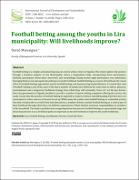Football betting among the youths in Lira municipality: Will livelihoods improve?
Abstract
Football betting is a complex and polarising issue in several urban centres in Uganda. This study explores the practice through a situation analysis of Lira Municipality, where a longitudinal study, incorporating three participatory methods (participant observation, interviews and storytelling) among twenty-eight participants was undertaken. Emerging themes were grouped into pathways of youth livelihood, football betting as a source of livelihood, the raison d'être for football betting, approaches used in football betting, and manoeuvring insubordination. It is noted that even if football’ betting is one of the ways of life that a number of youths have followed for some time; to others, pleasure, entertainment and a temporary livelihood strategy from which they will eventually “move on” are the key drivers. Since the government of Uganda decided to accredit a number of sports betting companies offering the service, the study reveals that the practice of football betting is expected to endure in future notwithstanding fresh bet-stars are conscripted or other sources of income be set up. While many the youths view football betting as a shameful activity that they would prefer to avoid if they had alternatives, a number of them consider football betting as a central part of their livelihood through which they can fulfil the expectations of their families and share responsibilities as members of the household. The study concludes that recognising those that perceive football betting as a provisional stage and those that perceive it as a livelihood path are important as the interventions to improve the youth livelihoods
Collections
- Research Articles [143]

